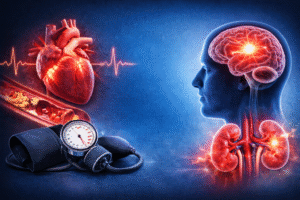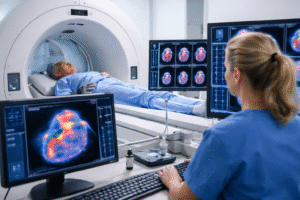3 Cutting-Edge Cardiology Treatments You Should Know About
Once a heart ailment takes root, you’ll naturally want to act fast so you can resume your normal life. The first step is to find a cardiologist in Tampa who has been serving the community for years and possesses the certifications to perform cutting-edge cardiology treatments that eliminate the pain and hassle of outdated methods.
If you want top-tier medical care that takes the discomfort out of an inherently uncomfortable situation, consult Dr. Sachin V. Diwadkar, FACC, FASE, of Ascent Cardiology. Well-versed in advanced medical services ranging from general cardiology to echocardiography to nuclear cardiology and interventional cardiology, Dr. Diwadkar is board certified in treatments to get patients on the road to recovery as quickly and painlessly as possible.
As a heart patient, you want treatment options that allow you to feel your best without first making you feel your worst. Board certified cardiologists offer more options for treating your heart ailment and can greatly reduce the discomfort of outdated treatments.
The content, views, and opinions communicated on this website do not represent the views of Ascent Cardiology Group. Reliance on any information provided by this website is solely at your own risk. Although this website contains links to other medical websites, this is strictly for informational purposes. Ascent Cardiology Group is not responsible nor do they approve of the content featured on any third party linked websites referenced on this website.

How High Blood Pressure Affects Your Heart, Brain, and Body
High blood pressure—also known as hypertension—is one of the most common and dangerous cardiovascular conditions worldwide. Often called the “silent

Stress and Heart Disease: How to Protect and Improve Your Heart Health
Chronic stress is increasingly recognized as a major risk factor for cardiovascular disease. Many high-performing, Type A individuals juggle demanding

What Is Nuclear Cardiology? Tests, Benefits, and What Patients Should Know
Nuclear cardiology is a specialized field of cardiovascular medicine that uses safe, low-dose radioactive tracers combined with advanced imaging technology
The Benefits of Interventional Cardiology
In this short article, we will explain why interventional cardiology is a preferred treatment option for many heart ailments. If you are looking for the best heart doctor in Tampa Bay, consult a cardiologist, like Dr. Sachin V. Diwadkar, FACC, FASE, of Ascent Cardiology, who can offer a wide range of services from time-tested general cardiology treatments to cutting-edge interventional cardiology procedures.
Cardiologists who are certified to perform interventional cardiology must undergo one to two years of specialized medical training after completing their fellowship in general cardiology. The commitment to mastering interventional cardiology helps to ensure patient success, and should not be overlooked when you are seeking out the best heart doctor in Tampa.
The content, views, and opinions communicated on this website do not represent the views of Ascent Cardiology Group. Reliance on any information provided by this website is solely at your own risk. Although this website contains links to other medical websites, this is strictly for informational purposes. Ascent Cardiology Group is not responsible nor do they approve of the content featured on any third party linked websites referenced on this website.

How High Blood Pressure Affects Your Heart, Brain, and Body
High blood pressure—also known as hypertension—is one of the most common and dangerous cardiovascular conditions worldwide. Often called the “silent

Stress and Heart Disease: How to Protect and Improve Your Heart Health
Chronic stress is increasingly recognized as a major risk factor for cardiovascular disease. Many high-performing, Type A individuals juggle demanding

What Is Nuclear Cardiology? Tests, Benefits, and What Patients Should Know
Nuclear cardiology is a specialized field of cardiovascular medicine that uses safe, low-dose radioactive tracers combined with advanced imaging technology
5 Lesser Known Heart Conditions
Considering the fact that about 735,000 Americans suffer from a heart attack each year, it’s important to keep a close eye on your heart health. Heart disease isn’t necessarily a rarity, and a person can become a part of these shocking statistics quite easily if they have high blood pressure, high cholesterol, or diabetes. Furthermore, people who smoke, are overweight or obese, have a poor diet, are physically inactive, or consume alcohol excessively have a higher risk of heart disease according to the Centers for Disease Control and Prevention (CDC).
If you suffer from any of these conditions or take part in activities that have been linked to heart disease, consult the best cardiologist in Tampa, Dr. Sachin V. Diwadkar, FACC, FASE, of Ascent Cardiology. In addition to CHD, heart disease can manifest in a variety of lesser known conditions, including heart failure, aortic aneurysms, arrhythmia, valvular heart disease, and heart infections.
• Aortic valve regurgitation
• Aortic valve stenosis
• Endocarditis
• Mitral valve regurgitation
• Mitral valve stenosis
• Mitral valve prolapse
The content, views, and opinions communicated on this website do not represent the views of Ascent Cardiology Group. Reliance on any information provided by this website is solely at your own risk. Although this website contains links to other medical websites, this is strictly for informational purposes. Ascent Cardiology Group is not responsible nor do they approve of the content featured on any third party linked websites referenced on this website.

How High Blood Pressure Affects Your Heart, Brain, and Body
High blood pressure—also known as hypertension—is one of the most common and dangerous cardiovascular conditions worldwide. Often called the “silent

Stress and Heart Disease: How to Protect and Improve Your Heart Health
Chronic stress is increasingly recognized as a major risk factor for cardiovascular disease. Many high-performing, Type A individuals juggle demanding

What Is Nuclear Cardiology? Tests, Benefits, and What Patients Should Know
Nuclear cardiology is a specialized field of cardiovascular medicine that uses safe, low-dose radioactive tracers combined with advanced imaging technology
Identifying Women’s Heart Attack Symptoms
If you think you are having a heart attack, it’s imperative that you call 911 immediately. In the case of a heart attack, be proactive and don’t hesitate to get the assistance you need. Every minute counts during a heart attack, and preserving these minutes could, in turn, save years of your life. Women’s symptoms are often underreported, so it’s imperative that you familiarize yourself with these symptoms to effectively identify a potential heart attack.
If you’ve been experiencing discomfort in your chest, shortness of breath, or a general feeling of uneasiness, consult a cardiologist in Tampa, FL, from Ascent Cardiology. Dr. Sachin V. Diwadkar, FACC, FASE, of Ascent Cardiology utilizes the latest non-invasive cardiovascular procedures to help improve patients’ heart health while minimizing discomfort and side effects.
• Feelings of fullness, pressure, or a squeezing sensation in the center of your chest lasting more than a few minutes or occurring irregularly over a period of time.
• Persistent aches or discomfort in one arm or both arms, as well as the back, neck, jaw, or stomach.
• Sudden shortness of breath accompanied (or unaccompanied) by chest discomfort. Cold sweat, nausea, or lightheadedness.
Remember, women are just as likely to experience the most common heart attack symptom — chest pain — as men; however, they are generally more likely to experience the symptoms listed above, too.
The best way to thwart a heart attack from happening in the first place is to find out if you’re at risk by consulting a cardiologist in Tampa. Your cardiologist can give you accurate insight about the state of your cardiovascular health and provide suggestions to help you prevent a heart attack from happening. Some common suggestions include quitting smoking and partaking in a simple, daily exercise routine. Healthy eating habits also go a long way to preserve your heart health.
The content, views, and opinions communicated on this website do not represent the views of Ascent Cardiology Group. Reliance on any information provided by this website is solely at your own risk. Although this website contains links to other medical websites, this is strictly for informational purposes. Ascent Cardiology Group is not responsible nor do they approve of the content featured on any third party linked websites referenced on this website.

How High Blood Pressure Affects Your Heart, Brain, and Body
High blood pressure—also known as hypertension—is one of the most common and dangerous cardiovascular conditions worldwide. Often called the “silent

Stress and Heart Disease: How to Protect and Improve Your Heart Health
Chronic stress is increasingly recognized as a major risk factor for cardiovascular disease. Many high-performing, Type A individuals juggle demanding

What Is Nuclear Cardiology? Tests, Benefits, and What Patients Should Know
Nuclear cardiology is a specialized field of cardiovascular medicine that uses safe, low-dose radioactive tracers combined with advanced imaging technology